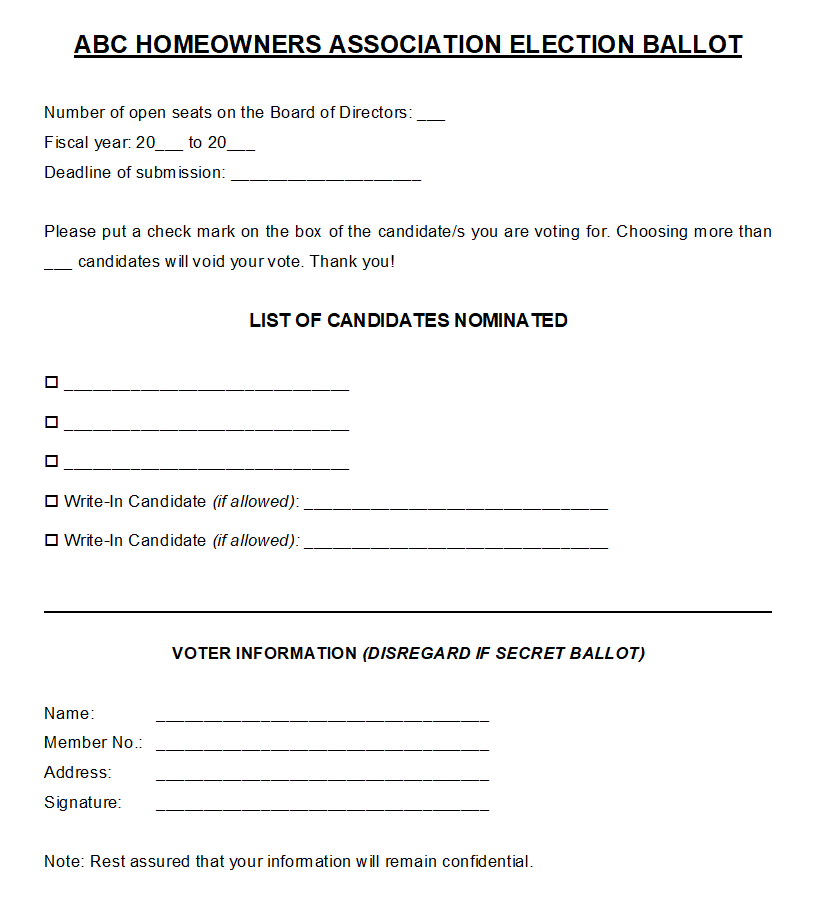Most homeowners associations go through an election season for board members. Here is everything you need to know about HOA elections.
What Are HOA Elections?
Every homeowners association is run by a set of volunteer members from the community known as the HOA board. In most associations, members are nominated and then elected into positions. These board members then take on the responsibilities of managing the association, performing a wide range of tasks that cover everything from dues collection and budget planning to maintenance management and covenant enforcement.
Board members are elected through a process called HOA elections. More often than not, elections take place at the HOA annual meeting, where homeowners vote for their choice through physical or even electronic ballots. While positions can vary per community, positions open for election on the HOA board typically include:
- President
- Vice President
- Secretary
- Treasurer
The Importance of an HOA Board Members Election
Much like any country or democratic body, elections matter to homeowners associations because they can affect the community. It is through HOA elections that homeowners decide who will run the association. This, in turn, has a large influence on the direction and future of the HOA.
Imagine a homeowners association with passionate and committed leaders who know what they are doing. That community will undoubtedly thrive, with curb appeal, property values, resident satisfaction, and even new homeowner rates shooting up. Now, imagine the opposite — an association led by inept and self-serving board members. As anyone would expect, that community will naturally suffer. It could even give way to fraud and corruption.
Elections can determine the future of an HOA, reflected in the people elected to serve. Board members who receive this honor (and burden) must perform their duties and obligations to the best of their abilities and within the community’s best interests.
Understanding State Laws and Your Legal Entity
An association’s type of legal entity greatly determines the HOA board of directors’ election process. Your type of legal entity depends on your location, i.e. the state where your HOA is located.
Many states recognize homeowners associations as non-profit corporations. In these states, HOAs must file their Articles of Incorporation with the Secretary of State. Such associations must also adhere to state laws that apply to non-profit corporations, particularly in terms of corporate governance and procedure. This includes HOA elections and the removal of board members.
The HOA Election Rules
It is important to establish operating rules for your election process. If your association currently does not have any HOA election rules, it is imperative to get started on them immediately. In some states, it is even mandatory to have such rules in place. For instance, in California, Civil Code Section 5105 requires the adoption of election rules.
In general, your election rules should cover the following:
- Specific candidate qualifications
- Nomination procedures
- Voting qualifications
- Rules for access to common areas and association media for campaigns
- The use of proxies
- How votes should be cast (secret balloting procedures)
- The voting period
Other things your bylaws should cover include:
- How many directors comprise the HOA board
- What positions are up for election
- How to fill vacancies if a director resigns or is no longer able to serve
The HOA Election Process
The exact specifications of the election process can vary from association to association. Thus, one community’s HOA board election rules may be different from the next. You will typically find your election process outlined within your association’s governing documents, particularly the bylaws. Certain state laws may also apply.
While no two associations are exactly alike, the HOA elections process generally follows the steps below:
Notice of Upcoming Election
When you have an upcoming HOA election, it is imperative to send a notice to all members. This notice should include what positions are open, the deadline for nominations, and the nomination procedures. While state laws and governing documents can vary, it is common to send this notice at least 30 days ahead of the nomination deadline.
Candidate Nomination
There are a number of ways candidates can be nominated:
- Self-nomination. This refers to owners nominating themselves as candidates.
- Floor nominations. While typically not required by state laws, floor nominations refer to nominations that take place during the meeting in the presence of a quorum. Keep in mind that floor nominations have a downside in that members who have already cast their votes prior to the meeting can’t vote for those nominated on the floor.
- Write-in nominations. This refers to owners nominating someone not included on the ballot by simply writing in their name. Of course, this method can make the process more complicated. There is also the issue of a write-in candidate winning but is unwilling to serve on the board.
Pre-Ballot Notice
After the submission of nominations, the HOA must then send a pre-ballot general notice to members. This notice should be sent prior to the distribution of ballots (at least 30 days before) and should include the following details:
- The list of candidate names that will appear on the ballots
- Where owners can send or hand-deliver their completed ballots (including date and time)
- The date, time, and location of the meeting where the ballot counting will take place
Voting
There are a few voting methods homeowners associations can use, depending on what state laws and your bylaws allow. HOA voting procedures can include:
- Written ballot. This method involves manually filling in the ballot with the voter’s details and candidate choice.
- Electronic ballot. This method uses the same basic principles of a written ballot. But, instead of mailing or hand-delivering the ballot, it is sent online.
- Secret ballot. This method is similar to the previous two methods with the exception of leaving out the voter information.
- Voting by proxy. This method is when a voter transfers their right to vote to another voter.
Some associations’ populations consist of a mix of homeowners and renters. While homeowners have a right to vote in HOA elections, renters are not always afforded the same right. Renters typically don’t have a right to vote in such matters. Moreover, they usually can’t be used as proxies, as most election rules state that proxies should be homeowners as well.
Of course, there can be exceptions to this rule. When in doubt, it is always best to check your governing documents or consult with an HOA attorney.
Counting of Votes
Associations normally use mail-in ballots for voting, but voting can also take place at the annual meeting itself. After closing the balloting period, the counting of votes will then commence. This portion typically occurs in front of everyone, usually with the help of an inspector. In some states, like California, a third-party inspector is mandatory.
Results
After tallying the votes, the winners are then announced. It is also customary (and sometimes required) to post the result of the HOA elections after the annual meeting for the benefit of those who could not attend.
HOA Elections: All About Quorums and Proxies
Homeowners associations often need a quorum to proceed with HOA elections. A quorum is the minimum number of people necessary for the HOA to conduct business. This number, though, can vary greatly from association to association. In HOA elections, it can be in the form of attendance or votes.
This is where proxy votes can help immensely. Not all homeowners have the time to attend the annual meeting or send in their ballots. As such, they may transfer their voting power to another voter by proxy. If your HOA decides to allow voting by proxy, make sure to establish procedures for that as well. Typically, associations will require a voter to fill out a proxy form to use this method.
Contesting the Results of HOA Elections
If members would like to challenge the results of an election, it is typically required to petition the court. While there may be other options available (check your governing documents or ask an attorney), petitioning the court is a normal route.
But, why exactly would anyone challenge election results? Reasons can include but are not limited to:
- Failure to send proper notice to members as stipulated within the bylaws
- Failure to establish a quorum as stipulated within the bylaws prior to voting and tallying
- Fraudulent acts (forging a ballot or not counting legitimate ballots)
HOA Board Officers Ballot Sample
A ballot should include all pertinent information related to the election. Use the HOA board election template below as your guide.

Download Your HOA Elections Ballot Template Here
Do Board Members Have Term Limits?
Whether or not your board has term limits will depend on state laws and your governing documents. Most associations do have term limits in place, primarily for the reason that nobody holds too much power for a long period of time. Changing board members also allow for fresh ideas and a brand new perspective.
Additionally, many associations stagger the terms of board members. This way, the board will never be completely made up of entirely new members. With an ever-rotating set of new members on the HOA board, it ensures that there is always a mix of experienced members and newbies.
The Reverse: Removing Members from the HOA Board
Board members have obligations and responsibilities to fulfill. They also have a fiduciary duty to always make decisions and take action according to the best interests of the community. That means avoiding conflicts of interest and self-serving strategies, among other things. Thus, when a member fails in this respect, they are not doing their job. This can lead to homeowners becoming dissatisfied and wanting to change up the board.
But, removing a board member is not always the first course of action owners should seek. If a board member is performing poorly, it may be worth raising the issue at a meeting first.
If more diplomatic approaches don’t work, though, there are other steps owners can take. For instance, many associations allow owners to call for a special meeting and vote to remove a board member, provided there is a quorum and an HOA majority vote. Of course, if a board member commits an illegal act such as embezzlement or other felonies, law enforcement can step in. This will make the removal process easier.
The best way to ensure no problem owners weasel their way into the board, though, is to vote wisely. Owners should carefully consider the list of candidates and actively participate in meetings. There is also the option of running for open positions themselves to truly make a worthwhile change in the community.
A Time-Consuming Yet Necessary Aspect of HOA Management
HOA elections can be a stressful time for community associations, especially with the amount of work and preparation time it often demands. But, it remains a critical part of every association’s structure and smooth governance. Therefore, all members of the community should take it seriously.
Managing election season usually comes as a challenge for HOA boards. With the help of an HOA management company like Clark Simson Miller, though, your board will find association management much easier. Call us today at 865.315.7505 or contact us online to learn more about our services.
RELATED ARTICLES:
- HOA Board Continuity Planning: Is Your Community All Set?
- What’s Best For Your Community: Self Managed HOA vs HOA Management Company
- 9 Things To Consider When Planning A Budget For A Community Association

